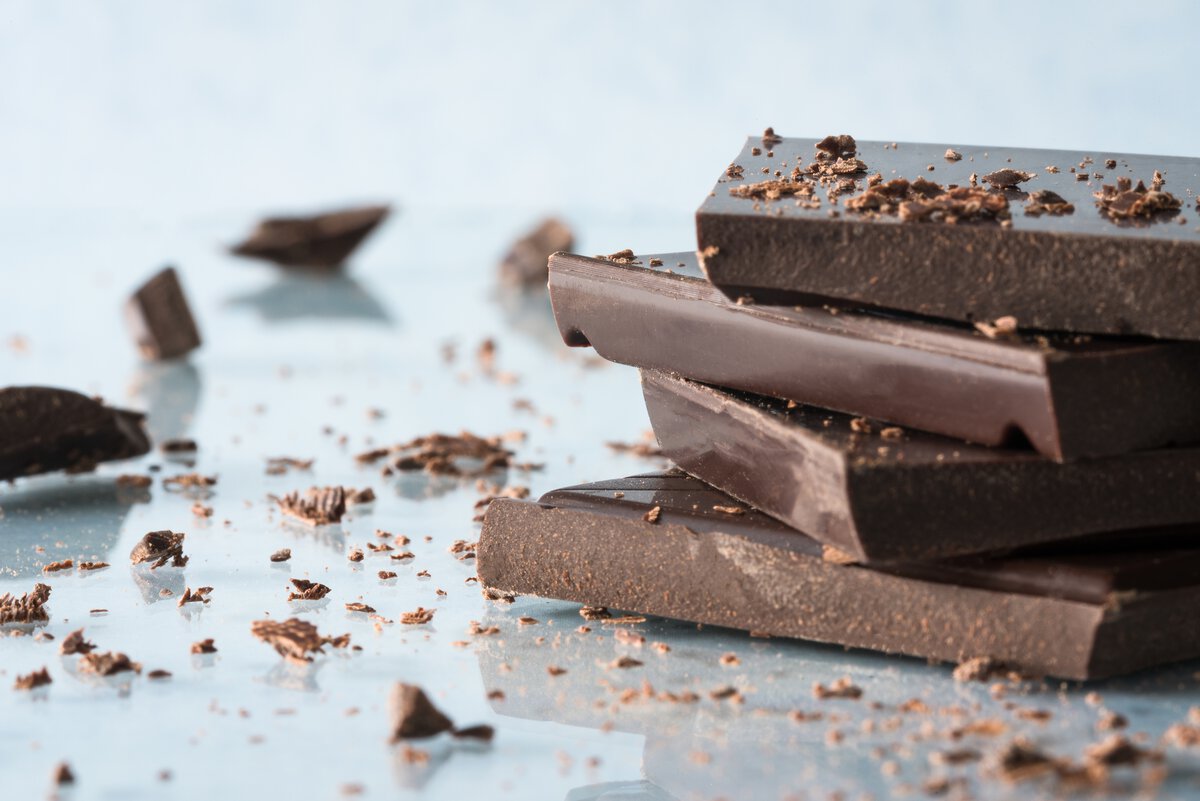February 19, 2024
10 Health Benefits of Chocolate: Reasons to Indulge

Club Mahindra


View all
140+
Resorts
February 19, 2024
Club Mahindra
This blog takes you through some of the benefits of chocolate. Growing up, you were probably told more than once to limit your chocolate intake, often with a warning that it was bad for your health or might spoil your dinner. However, it turns out that chocolate has benefits as well, especially when enjoyed in moderation.
Beyond its irresistible taste and the sheer joy it brings to your taste buds, chocolate holds a treasure trove of health advantages that can positively impact your well-being.
1. Antioxidant Powerhouse
2. Heart Health Benefits
3. Cholesterol Improvement
4. Blood Pressure Reduction
5. Mood Enhancer
6. Cognitive Function
7. Skin Protection
8. Anti-inflammatory Effects
9. Blood Sugar and Insulin Sensitivity
10. Mineral-Rich Composition

It is mainly one of the benefits of eating dark chocolate. It is like a treasure trove of antioxidants, packed with goodies like polyphenols and flavonoids. These compounds neutralize free radicals, reducing oxidative stress linked to chronic diseases. So, eating dark chocolate isn't just a treat for your taste buds; it's like giving your body a shield, helping to prevent cell damage and keep inflammation at bay.

The consumption of chocolate, particularly dark chocolate, has been found to offer various benefits for heart health, primarily due to its rich flavonoid content. The flavonoids can improve circulation, reduce blood pressure, and lower the risk of heart disease. These benefits are due to the improved health of the inner lining of blood vessels and less hardening of the arteries, leading to a healthier heart and blood vessels.

One of the known health benefits of chocolate is that it can positively affect cholesterol levels. Research indicates it can elevate HDL (good) cholesterol and potentially lower LDL (bad) cholesterol. This lipid-modulating effect contributes to a reduced risk of cardiovascular diseases, highlighting chocolate's role in a balanced diet.

The flavonoids in chocolate encourage the production of nitric oxide by the endothelium, leading to vasodilation. This process reduces blood flow resistance, effectively lowering high blood pressure. Such properties make dark chocolate a potential dietary adjunct for hypertension management.

One of the great benefits of eating chocolate is that it puts you in a better mood. Chocolate contains mood-boosting chemicals, including phenylethylamine, which trigger endorphin release and promote well-being. Its consumption can improve mood and reduce stress levels, making it a natural comfort food during emotional lows.

Research indicates that one of the benefits of eating dark chocolate is that it can enhance cognitive functions, potentially reducing the risk of neurodegenerative diseases and improving mental performance, particularly in older individuals. It suggests dark chocolate offers a pleasurable eating experience and supports brain health and cognitive longevity.

Flavonols in dark chocolate can shield the skin from sun damage, improve blood circulation, and enhance skin hydration and thickness. These effects contribute to healthier, more resilient skin, demonstrating chocolate's cosmetic benefits alongside dietary ones.

Chocolate's polyphenols exhibit anti-inflammatory properties, which can diminish systemic inflammation. Lowering inflammation levels in the body can prevent chronic conditions, emphasizing the importance of including flavonoid-rich foods like dark chocolate in the diet.

One of the benefits of eating dark chocolate is that its moderate consumption may improve insulin sensitivity and have a minimal impact on blood sugar levels. It suggests potential benefits for blood sugar management, making it a preferable choice for those monitoring their glycaemic level.

Chocolate is a valuable source of essential minerals such as magnesium, iron, zinc, and copper. These nutrients support various bodily functions, including immune response, red blood cell production, and bone health, underscoring chocolate's nutritional value beyond its taste.
It's necessary to note that not every chocolate is created equal. Dark chocolate with a high cocoa (70% or more) contains more flavonoids. It is generally considered healthier than white or milk ones, having more sugar and fewer beneficial compounds. Moderation is key, as chocolate is also high in calories and can contribute to weight gain if consumed in large amounts.
To conclude, chocolate is more than a guilty pleasure. There are benefits of eating chocolate when enjoyed in moderation. From mood enhancement to heart health, chocolate can positively contribute to your life. So, go ahead and savour your chocolate, but responsibly, of course.
FAQs
Health professionals recommend consuming approximately 30-60 grams of dark chocolate daily to reap its health benefits. That equates to roughly two to four small squares from a chocolate bar.
Many studies suggest that one of the benefits of eating chocolate is that it can help lessen period cramps and pain. Dark chocolate is a food that reduces swelling and muscle tightness, causing cramps.
Eating chocolate in the morning is considered the optimal time. Mix it into your breakfast cereal or consume it as an energy bar. Dark chocolate is a nutritious snack that helps stabilize blood sugar levels and provides daily energy.
For someone aiming to lose weight by eating dark chocolate, it's recommended to consume it either on an empty stomach or 30 minutes following a meal with solid food. Dark chocolate can also be enjoyed as a snack between lunch and dinner.
How long your body takes to digest chocolate can differ based on factors like the kind of chocolate, your metabolic rate, and other personal aspects. Typically, chocolate digestion is completed within 2 to 4 hours.
Dark chocolate contains theobromine, a compound that can slightly increase body temperature, suggesting a warming effect. That is one of the benefits of eating chocolate during winter.
Mahindra Holidays & Resorts India Ltd. (MHRIL), a part of Leisure and Hospitality sector of the Mahindra Group, offers quality family holidays primarily through vacation ownership memberships and brings to the industry values such as reliability, trust and customer satisfaction. Started in 1996, the company's flagship brand ‘Club Mahindra’, today has over 300,000 members , who can holiday at 140+ resorts in India and abroad.
We use cookies to personalise content and to provide you with an improved user experience.By Continuing to browse this site you consent to the use of cookies.Please visit our cookie policy for further details.

Welcome to ClubMahindra.com In order to provide a personalised experience for you, we use cookies to enable some website functionality. Cookies help us see which articles most interest you; allow you to easily share articles on social media channels; permit us to deliver content personalised to your interests and locations; along with many other site benefits. For more information, please review our Cookie Policy
When you visit any website, it may store or retrieve information on your browser, mostly in the form of cookies. This information might be about you, your preferences or your device and is mostly used to make the site work as you expect it to. The information does not usually directly identify you, but it can give you a more personalized web experience. Because we respect your right to privacy, you can choose not to allow some types of cookies. Click on the different category headings to find out more and change our default settings. However, blocking some types of cookies may impact your experience of the site and the services we are able to offer.
Because we respect your right to privacy, you can choose not to allow some types of cookies and you have the right to withdraw your consent by send a mail to email id [email protected]
These cookies are essential in order to enable you to move around the site and use its features, such as accessing secure areas of the site. Without these cookies, services you have asked for cannot be provided.
These cookies allow us to employ data analytics so we can measure and improve the performance of our site and provide more relevant content to you. These cookies don't collect information that identifies a visitor down to an individual level that is available to us. These cookies are not passing personally identifiable information to any external third party other than in limited cases when we engage a service provider to act on our behalf but who is then unable to use the data for their own purposes.
Performance cookies are generally third-party cookies from vendors we work with or who work on our behalf that collect information about your visit and use of the Club Mahindra website, for instance which pages you visit the most often, and if you get error messages from web pages. These cookies don't collect information that identifies a visitor. All information these cookies collect is anonymous and is only used to improve your overall experience on how the website works. Third party vendors may have access to this data and may use it to improve their overall services and offerings.
Functionality cookies allow a site to remember choices you make (such as your user name, language or the region you are in) and provide more enhanced, personal features. These cookies cannot track your browsing activity on other websites. They don't gather any information about you that could be used for advertising or remembering where you've been on the Internet outside our site.
Third-party advertising and social media cookies are used to (1) deliver advertisements more relevant to you and your interests; (2) limit the number of times you see an advertisement; (3) help measure the effectiveness of the advertising campaign; and (4) understand people's behaviour after they view an advertisement. They are usually placed on behalf of advertising networks with the site operator's permission. They remember that you have visited a site and quite often they will be linked to site functionality provided by the other organization. This may impact the content and messages you see on other websites you visit. If you do not allow these cookies you may not be able to use or see certain these sharing tools content on our website.